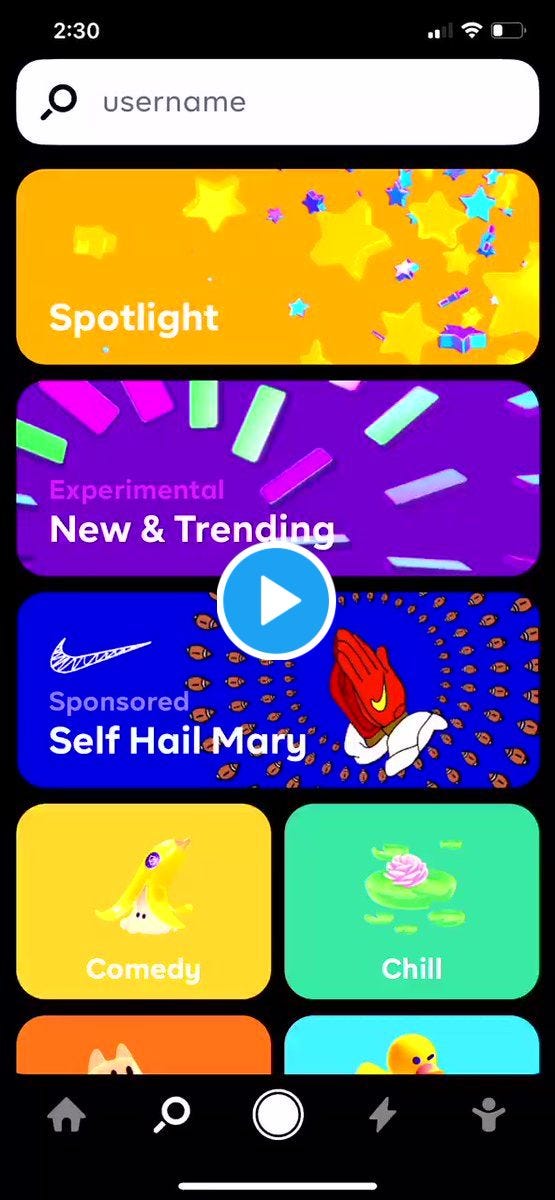I had this whole thing planned where I was going to make a bunch of food puns around this being the 8th/ate edition of Vanity Metrics: The Big Stuff(ed Crust Pizza), Vine Bytes Back. You get it. It wasn’t great. Let’s get to it.
The Big Stuff

byte.co
Vine is back, sort of.
Vine, the Twitter-owned video app that birthed a thousand comedy influencers, abruptly ended it’s run to 200 million users in 2016 after just three years. The 6-second looping video platform began life as a casual app that was positioned as a perfect complement to Twitter’s need to grow and compete (Twitter purchased Vine for $30 million in 2012). What wasn’t expected was the way the app quickly took on a new life. The short time limit on videos forced users to become incredibly creative, sparking a whole new way to approach creating content. At its height, brand influencers were reportedly pulling in over $200K for sponsored posts. Not bad for 6 seconds of work (kidding).
Unfortunately, the app couldn’t sustain its rapid growth. Vine’s small development team fell behind as competitors like Snapchat and Instagram continued to roll out new features, and suffered as it’s most popular personalities chased brand dollars on to other platforms.
Since then, Vine Co-Founder Dom Hoffman has been hard at work on Vine’s successor. Byte launched to the public on January 24th and has already seen swift uptake, with over 1.2 million downloads in the first week. IMO, this reflects the current demand for new video outlets, as people furiously vie to be the next big thing in social video. Being an Influencer is the new Gold Rush.
Some things to ask yourself if you’re considering it for your brand:
Spambots are already rampant in the comments. The company has promised to clamp down on the issue, but it’s not a good look.
Some quality of life filters, such as block and limit, are not yet present to curb harassment and spam. This can drive away early adopters.
Byte has made it clear they are in it for the brand dollars. They have already announced a brand partnership and monetization program, and already launched promoted campaigns with Nike. This may be fun at first, but without authentic content, will it drive interest in users to keep coming back?


The thinking here seems fairly obvious: in 2020, Influencers drive eyeballs. Attracting influencers will take a lot of cash. Cash will come from ads. Therefore: be prepared to see a high rate of ads in the app. Expect to see more stories about Byte this year!
“Don’t you know who I am!? I’m the Juggernaut, [lady]!”
Facebook reported it’s earnings from Q4 2019. I know, this isn’t an investment newsletter. If it was I’d be the last person you’d want to hear from. But for social media professionals, it’s a good indication of how Facebook will plan changes to continue to make investors happy. In other words, how the world’s largest ad network will shift to remain profitable. Not that they’re having any trouble remaining profitable…
Without diving into analysis on things I have no business analyzing, here are some points that are worth noting:
Earnings slowed for the first time in four years. This is relative, as money is continuing to flow into Facebook’s vaults Scrooge McDuck style. But the rate has slowed, and that’s causing some raised eyebrows.
Facebook still generates almost all of its revenue (98%) from ads on Instagram and Facebook. About $21 billion dollars for Q4 2019.
The Facebook app continues to be the leader in monthly users, with over 2 billion. This number may be up for debate, but Facebook is sticking to it.
WhatsApp may have lots of users, but Facebook isn’t making any money from it.
Many WhatsApp users do not use other Facebook products.
Messenger ads aren’t performing as well as expected. Facebook hasn’t disclosed data on how well new placements, like Stories in the app, are performing.
Facebook isn’t reporting stats from “other” categories, such as its Oculus VR headsets and Portal devices, though it’s already been announced that the ad network will be expanding to the Oculus. Oculi?
It’s also seen an 87% rise in “administrative and general” costs, including more staff to oversee content moderation, and a half-billion-dollar fine for violating state privacy laws with its photo-tagging features.
Slowing growth and mounting costs undercut a lot of the announcement. Facebook is faced with finding new ways to squeeze money out of users the only way it knows how: ads. My prognostication: expect to see a new emphasis on new ad units like Messenger, and further integration of services and content sharing from popular apps like Instagram back to Facebook proper.
Fun facts: Instagram brought in an estimated $20B to Facebook in 2019. That’s $5 billion more than YouTube on the year, and means Facebook’s seeing a return on its initial purchase ($1B) every 18 days.
The Small Stuff
The Canadian Privacy Commissioner is seeking to open a hearing into Facebook’s apparent violations of privacy laws after failing to implement recommendations to address privacy breaches.
Tik Tok has implemented web-uploads at tiktok.com/upload, always a good thing for content creators chained to a desk.
Twitter will start flagging posts from politicians that break its community standards, still won’t ban them.

Twitter will also start flagging posts with “manipulated photos or video”


LinkedIn’s employee advocacy platform, Elevate, is coming to Company Pages. The tool allows companies to share content with employees for amplification but also allows employees to suggest content up the line. Employee engagement is one of the largest drivers on LinkedIn. Details are still vague, but the premium service may see some options open to a free tier.
Instagram has a few new features: reply to stories with a GIF, see and unfollow accounts you least interact with, and “see all” options for templates on Stories.


Douyin, AKA TikTok for China, has launched filters and a campaign to help support doctors dealing with the Coronavirus outbreak.
Tik Tok users are complaining that content deletion with no explanation is becoming an issue. Tik Tok points out it reserves the right to remove content for any reason.
Money transfers may be coming to WhatsApp. Testing is underway in India.
The Olympics are coming to social starting… well now. Facebook has released a guide to help athletes secure their accounts and report imposters, and Snapchat has announced its huge content partnership with NBC to produce 4 live shows daily (in a vertical format) and daily content beginning in July.
Bonus for your phonus
Let the good listening continue. The Geekout with Matt Navarra podcast recently sat down with Chris Messina, inventor of the hashtag, about the next evolution of social media in our everyday lives. Check it out.

That’s it for this week. A footnote: I’ve been dealing with some business issues (I am self-employed) that have sucked up a lot of my time and impacted my health. Since this newsletter isn’t paying the bills, I had to miss our first issue last week. While I can’t promise I won’t miss an issue in the future, I can promise I am dedicated to continuing to provide this resource to those of us in the industry. You can help by sharing and reposting to your network. It means the world to me that people have taken the time to let me know they enjoy and appreciate Vanity Metrics. See you in the next issue!
Ryan LaFlamme has worked in social media marketing and advertising for longer than the job had a title. He formed the independent social consultancy Hub and Spoke in 2016, and can be found hanging out on Twitter @ryanlaf Now accepting new clients and speaking engagements.







